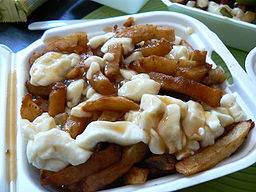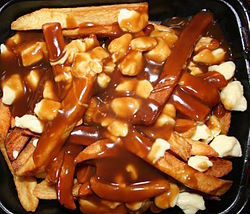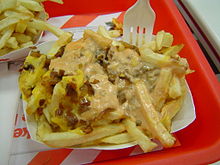- Poutine
-
Poutine 
Poutine with cheese curds on top of fries covered with a thin gravyOrigin Place of origin  Canada
CanadaRegion or state  Quebec (late 1950s)
Quebec (late 1950s)Creator(s) multiple claims Dish details Course served Main Dish or a side Serving temperature Hot Main ingredient(s) French fries
Cheese curds
Brown gravy or sauceVariations Multiple Poutine (
 /puːˈtiːn/; Quebec French pronunciation [putsɪn] (
/puːˈtiːn/; Quebec French pronunciation [putsɪn] ( listen)) is a dish of French fries and fresh cheese curds, covered with brown gravy or sauce. Sometimes additional ingredients are added.[1]
listen)) is a dish of French fries and fresh cheese curds, covered with brown gravy or sauce. Sometimes additional ingredients are added.[1]Poutine is a fast food dish that originated in Quebec and can now be found across Canada. It is sold by national and international fast food chains, in small "greasy spoon" type diners (commonly known as "cantines" or "casse-croûtes" in Quebec) and pubs, as well as by roadside chip wagons (commonly known as "cabanes à patates", literally meaning "potato shacks"). International chains like McDonald's,[2] A&W,[3] KFC and Burger King[4] also sell mass-produced poutine in Canada. Poutine may also contain other ingredients such as beef, pulled pork or lamb. Atypically, the dish may also include additional ingredients such as lobster meat, rabbit confit, caviar, and truffles.[5]
Contents
Origins
The dish apparently originated in rural Quebec, Canada, in the late 1950s. Several Québécois communities claim to be the birthplace of poutine, including Drummondville (by Jean-Paul Roy in 1964),[6] Saint-Jean-sur-Richelieu, and Victoriaville.[citation needed] One often-cited tale is that of Fernand Lachance, from Warwick, Quebec, which claims that poutine was invented in 1957.[7] Lachance is said to have exclaimed ça va faire une maudite poutine ("it will make a damn mess"), hence the name. The sauce was allegedly added later, to keep the fries warm longer.
Etymology
The Dictionnaire historique du français québécois lists 15 different meanings of poutine in Quebec and Acadian French, most of which are for kinds of food; the word poutine in the meaning "fries with cheese and gravy" is dated to 1978. Other senses of the word have been in use at least since 1810.[8]
While the exact provenance of the word "poutine" is uncertain, some of its meanings undoubtedly result at least in part from the influence of the English word pudding. Among its various culinary senses, that of "a dessert made from flour or bread crumbs" most clearly shows this influence; the word pouding, borrowed from the English pudding, is in fact a synonym in this sense. The pejorative meaning "fat person" of poutine (used especially in speaking of a woman) is believed to derive from the English pudding "a person or thing resembling a pudding" or "stout thick-set person".[9]
In other meanings of poutine, the existence of a relation to the English word pudding is uncertain. One of these additional meanings — the one from which the name of the dish with fries is thought to derive — is "unappetizing mixture of various foods, usually leftovers." This sense may also have given rise to the meaning "complicated business, complex organization; set of operations whose management is difficult or problematic."
The Dictionnaire historique mentions the possibility that the form poutine is simply a gallicization of the word pudding. However, it considers it more likely that it was inherited from regional languages spoken in France, and that some of its meanings resulted from the later influence of the similar-sounding English word pudding. It cites the Provençal forms poutingo "bad stew" and poutité "hodgepodge" or "crushed fruit or foods"; poutringo "mixture of various things" in Languedocien; and poutringue, potringa "bad stew" in Franche-Comté as possibly related to poutine. The meaning "fries with cheese and gravy" of poutine is among those held as probably unrelated to pudding provided the latter view is correct.[8]
In Maine and northwestern New Brunswick, poutine may be called "mixed fries", "mix fry", or simply "mix",[citation needed] although the term "poutine" has been gaining in popularity in recent years. In some parts of eastern Canada, the term poutine is not commonly used. In Baie Sainte-Anne, New Brunswick for example the word patachou is used to describe this dish.
Nutritional information
A typical recipe of Poutine has the following nutrition facts per serving (around 160g):[10]
- Calories: 305
- Total fat (g): 19.5
- Cholesterol (mg): 40
- Carbohydrates (g): 21.3
- Protein (g): 12.1
Recipe
In the basic recipe for poutine, French fries are topped with fresh cheese curds, and covered with brown gravy or sauce. The French fries are of medium thickness, and fried so that the inside stays soft, while the outside is crunchy. The gravy used is generally a light chicken, veal or turkey gravy, mildly spiced with a hint of pepper, or a sauce brune which is a combination of beef and chicken stock, originating in Quebec. Heavy beef or pork-based brown gravies are rarely used. Fresh cheese curds (not more than a day old) are used. To maintain the texture of the fries, the cheese curd and gravy is added immediately prior to serving the dish.
Traditional Poutine sauces (mélange à sauce poutine) are sold in Quebec and Maritime grocery stores in jars or cans and in powdered mix packet.
Variations
There are many variations of poutine. Italian poutine is a common one that replaces the gravy with spaghetti sauce (a thick tomato and ground beef sauce, similar to Bolognese sauce), while another variation includes sausage slices.[11] A minor variation is using grated cheese instead of cheese curds, and is quite common in the Prairies and Western Canada, mostly due to cost. More rare "Greek" poutine consists of shoestring fries topped with a warm Mediterranean vinaigrette, gravy, and feta cheese. Mexican poutine, also referred to as carne asada fries, consists of fries, carne asada, guacamole, sour cream, cheese, and pico de gallo. It is frequently served with hot sauce.
Some restaurants offer poutine with such additions as chicken, bacon, or Montreal-style smoked meat. Poutine Dulton, which is offered in a few places, is made with ground beef, onions, and sausages. Some such restaurants even boast a dozen or more variations of poutine. For instance, more upscale poutine with three-pepper sauce, Merguez sausage, foie gras or even caviar and truffle can be found.[12]
Some named variations may not necessarily be prepared with the same ingredients in different establishments. For example, "poutine Galvaude" adds shredded turkey or chicken and green peas,[13] similar to the typical Québécois "hot chicken" sandwich.
Some variations eliminate the cheese, but most francophone Quebecers would call such a dish a "frite sauce" ("french fries with sauce") rather than poutine. Shawinigan and some other regions have Patate-sauce-choux where shredded raw cabbage replaces cheese.
Poutine can also sometimes be combined with pommes persillade (cubed fried potatoes topped with persillade) to produce a hybrid dish called poutine persillade.
Fast food combination meals in Canada often have the option of getting french fries "poutinized" by adding cheese curds (or shredded cheese in the Prairies and Western Canada) and gravy.
In the Maritimes, a variation topped with donair meat is offered as "donair poutine".
Outside Canada, poutine is found in northern border regions of the United States such as New England and the Upper Midwest. These regions offer further variations of the basic dish. Cheeses other than fresh curds are commonly used (most commonly mozzarella cheese), along with beef, brown or turkey gravy. In the county culture especially, a mixed fry can also come with cooked ground beef on top and is referred to as a hamburger mix, though this is less popular than a regular mix.
Similar dishes
Chips and Gravy ("chips" being the British term for thicker French fries) is a staple of the cheaper bistro style menus, in such places as Royal Canadian Legion and Workers Clubs, where the food offered would not be considered "fast food" but is still cheap and filling, especially for children.[original research?].
In Newfoundland and Labrador most non-national chain restaurants serve a traditional dish called chips, dressing and gravy. Dressing is a mixture of mainly white bread crumbs and savoury and is often referred to as stuffing outside of Atlantic Canada. Chips, dressing and gravy is served much like poutine, except for the dressing substituting for the cheese. While loved by Newfoundlanders and Labradorians, the dish is not widely known of outside the Canadian province.
Disco fries also known as "Elvis Fries," served in New Jersey and select New York City diners, are made with brown gravy, mozzarella, and heavier steak fries. Elsewhere in the greater New York City area and Long Island, diners serve "cheese fries," using either American (processed) cheese or mozzarella. Diners in New York, New Jersey, and Connecticut serve "gravy-cheese-fries" or even "french fries with cheese and gravy"; these are most commonly steak fries, brown gravy, and American cheese.
The American fast food diner chain, Waffle House, offers hashbrowns Covered in processed American cheese, Topped with chili, or Country with sausage gravy amongst other topping options. The chain operates throughout the Southern parts of the United States.
Cheese fries are also served in many diners in the American Southwest; in Texas, for example, they usually include at least one variety of grated Cheddar cheese, and are commonly served with ranch dressing and, sometimes, bacon, jalapenos and chives, whereas in New Mexico, the fries are typically served with green chili and cheese, creating a dish that combines two Southwest favorites, french fries and chile con queso. On the secret menu at In-N-Out Burger, you can get "animal fries," a dish with cheese, grilled onions, and their secret sauce smothered on fries.
In the United Kingdom (particularly Scotland), the dish is simply named Chips, Cheese and Gravy The dish is common in chip shops, bakeries and other small, local fast food stores and consists of thick-cut chips, shredded cheddar cheese (and sometimes a 50/50 mix of cheddar and mozzarella cheese), topped with thick gravy. A variant is sometimes made with curry sauce instead of gravy. The dish is believed to have developed independently of poutine.[citation needed].
In the Netherlands, a dish named "kapsalon" (hair salon) consists of french fries, shawarma meats or doner kebab and grilled gouda cheese, topped with salad, garlic sauce and sambal. The dish was invented in Rotterdam by a kebab shop owner who served it to employees of a local hair salon. It gained popularity and is now widely available across the Netherlands.
In Göteborg, Sweden, at many fish stands one can order a dish called fisktin, which consists of french fries, mozzarella cheese, and fish sauce with salmon and herring chunks.
Poutine in politics
In a Talking to Americans segment on the television series This Hour Has 22 Minutes during the 2000 American election, Rick Mercer posed as a commentator and asked several people (including then-Texas governor George W. Bush) what they thought of "Prime Minister Jean Poutine" and his endorsement of Bush for president. (The Prime Minister of Canada at the time was Jean Chrétien). None of the interviewees noticed the insertion of "Poutine."
A few years later when Bush made his first official visit to Canada as President, he joked during a speech, "I told [Prime Minister] Paul [Martin] that I really have only one regret about this visit to Canada. There's a prominent citizen who endorsed me in the 2000 election, and I wanted a chance to finally thank him for that endorsement. I was hoping to meet Jean Poutine." The remark was met with laughter and applause.[14]
See also
- Cheeseburger
- Velouté sauce[15]
- Demi-glace
- List of accompaniments to french fries
References
- ^ Knight, A (Monday, June 11, 2007). "Poutine 101". Knight's Canadian Info Collection. http://members.shaw.ca/kcic1/poutine.html. Retrieved July 1, 2011.
- ^ Day, Adam. "Oh Canada, we stand on guard for ... poutine?". The Digital Times. Kamloops, BC: Journalism Students at Thompson Rivers University. http://www.cariboo.bc.ca/news/stories02Nov25/poutineK.html. Retrieved May 19, 2008.
- ^ "Nutritional Facts — Small Poutine". A&W Trade Marks. http://www.aw.ca/publicinfo.nsf/nutritionalfacts. Retrieved May 19, 2008.
- ^ "Our menu — Poutine". Burger King. http://www.burgerking.ca/en/1158/index.php?buildid=42. Retrieved May 19, 2008.[dead link]
- ^ "torontolife.com". http://www.torontolife.com/features/total-eclipse-heart/.
- ^ Sekules, Kate (May 23, 2007). "A Staple From Quebec, Embarrassing but Adored". The New York Times. http://www.nytimes.com/2007/05/23/dining/23pout.html?ex=1337572800&en=42c5e67c003989af&ei=5124&partner=permalink&exprod=permalink. Retrieved May 19, 2008. Article on Poutine coming to New York City
- ^ "The 50 Inventions — Poutine". The Greatest Canadian Invention. Canadian Broadcasting Corporation. http://www.cbc.ca/inventions/inventions.html. Retrieved May 19, 2008.
- ^ a b Claude Poirier, Steve Canac-Marquis (1998). Dictionnaire historique du français québécois. Université Laval. ISBN 2763775578.
- ^ "Poutine". Base de données lexicographiques du Québec. Trésor de la langue française au Québec – Université Laval. http://www.tlfq.ulaval.ca/bdlp/quebec.asp. Retrieved May 19, 2008.
- ^ http://allrecipes.com/Recipe/Poutine/Detail.aspx
- ^ Zimmerman, Karla (2008). Canada (10th edition ed.). Footscray, Victoria, London: Lonely Planet. ISBN 9781741045710. OCLC 191754242.
- ^ Krauss, Clifford (April 26, 2004). "Quebec Finds Pride in a Greasy Favorite". The New York Times. http://www.nytimes.com/2004/04/26/international/americas/26mont.html?ex=1398312000&en=27b2d7db41c369a4&ei=5007. Retrieved May 19, 2008.[dead link]
- ^ "Reviews — Maamm Bolduc". http://www.montrealpoutine.com/reviews.html. Retrieved March 10, 2008. "...; Galvaude (turkey, green peas);..."
- ^ "President Discusses Strong Relationship with Canada" (Press release). December 1, 2004. http://georgewbush-whitehouse.archives.gov/news/releases/2004/12/20041201-4.html. Retrieved May 19, 2008.
- ^ "montrealpoutine.com". http://www.montrealpoutine.com/recipes.html.
External links
- Poutine on The News (1991), CBC News Report on Poutine
- Poutine no longer just a cheesy junk food treat
- A podcast of CBC Radio "Q"; Jian Ghomeshi interviews Marion Kane on the origins of Poutine
Cheese dishes Aligot • Almogrote • Arizona cheese crisp • Bacon, egg and cheese sandwich • Beer cheese (spread) • Bryndzové halušky • Cauliflower cheese • Cervelle de canut • Cheese bun • Cheesecake • Cheese dream • Cheese fries • Cheese on toast • Cheese pudding • Cheese puffs • Cheese roll • Cheese sandwich • Chèvre chaud • Chhena Gaja • Chhena Kheeri • Chhena jalebi • Chhenna Poda • Croque-monsieur • Fondue • Frico • Gougère • Guvchelvka • Hauskyjza • Insalata Caprese • Kasseropita • Lasagna • Liptauer • List of cheese soups • Macaroni and cheese • Mattar paneer • Moretum • Mornay sauce • Mozzarella sticks • Nachos • Obatzda • Pastizz • Pimento cheese • Poulet au fromage • Poutine • Provoleta • Quesadilla • Quesito • Raclette • Rasabali • Saganaki • Schmear • Shahi paneer • Smažený sýr • Sopapilla cheesecake • Spanakopita • Supplì • Syrniki • Tirokafteri • Tiropita • Túrós csusza • Urnebes • Vatrushka • Welsh rarebitCategories:- Canadian cuisine
- Fast food
- Street food
- Potato dishes
- Quebec cuisine
- Cheese dishes
Wikimedia Foundation. 2010.



